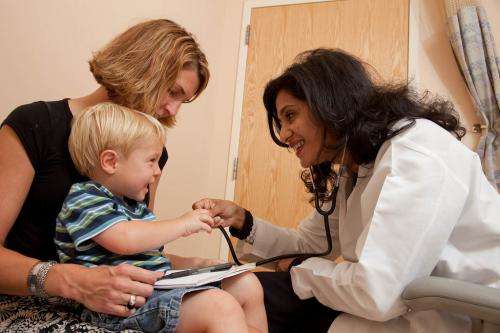Researchers hope their findings can help inform understanding of the mental health of paediatric teams in order to address a growing shortage of health-care professionals nationally. Credit: UW Health
A study has found that medical staff regularly exposed to paediatric medical trauma experience more symptoms of secondary traumatic stress than their counterparts, and that the problem is most acute for those under 25 years of age.
The study involved researchers from Edith Cowan University, Princess Margaret Hospital for Children, the University of Western Australia, Curtin University, Burn Service of Western Australia and the Fiona Wood Foundation.
ECU's Dr Sarah McGarry says while it has been established that health-care professionals working with traumatically injured adults were at increased risk of experiencing negative psychological distress, little research has been done to date on those working with paediatric patients.
"We found that participants demonstrated statistically significant more symptoms of secondary traumatic stress, which has symptoms similar to those of post-traumatic stress disorder, including fear, sleep difficulties and avoidance of intrusive clinical images," Dr McGarry says.
"They also showed lower resilience, less use of 'dealing with the problem' and more use of non-productive coping, as well as less compassionate satisfaction, which is the positive feeling associated with helping and caring for patients."
Health professionals under 25 years of age in particular used more non-productive coping strategies (worry, self-blame, keeping to self, wishful thinking and ignoring the problem), less 'sharing as a coping strategy' and tended to have more symptoms of depression.
They reported less compassion satisfaction and demonstrated lower rates of resilience compared to their older and more experienced colleagues.
"These results indicate that young health professionals are vulnerable to experiencing significant distress, and interventions are required to support them, particularly during the transition time from university into clinical practice," Dr McGarry says.
"We also need longitudinal research to assess whether young health professionals exit the profession when they encounter distress, leaving only the most resilient to continue, or whether they mature and learn to adjust to the working environment.
"High staff turnover rates may suggest the former."
The study involved Princess Margaret Hospital staff members working with children with severe acquired brain injury or a burn injury and used a range of tools, including the Impact of Events Scale Revised, Depression Anxiety Stress Scale, Professional Quality of Life Scale and the Coping Scale for Adults.
Researchers hope their findings can help inform understanding of the mental health of paediatric teams in order to address a growing shortage of health-care professionals nationally.
"Acknowledging the impact of paediatric medical trauma on health professionals' mental health is an important step towards maintaining a healthy workforce," Dr McGarry says.
More information: McGarry, S., Girdler, S., McDonald, A., Valentine, J., Lee, S.-L., Blair, E., Wood, F. and Elliott, C. (2013), "Paediatric health-care professionals: Relationships between psychological distress, resilience and coping skills." Journal of Paediatrics and Child Health, 49: 725–732. DOI: 10.1111/jpc.12260
Provided by Science Network WA





















